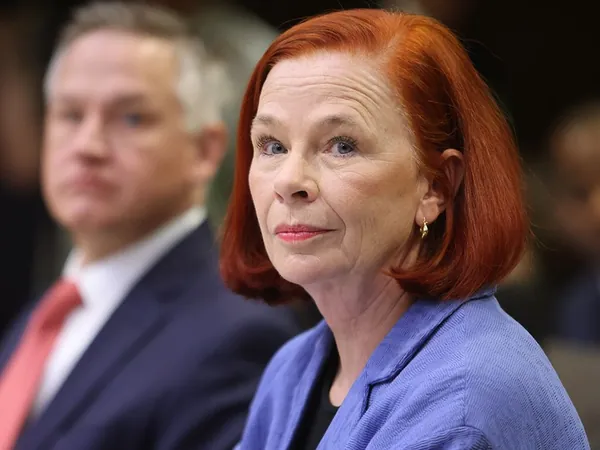
CBC President Warns of Growing "Defund" Movement as Future of Public Broadcasting Hangs in Balance
2024-10-15
Author: Olivia
CBC President's Concerns
In a striking email sent earlier this year, Catherine Tait, the President and CEO of Canada’s national broadcaster CBC, alerted colleagues to a significant movement aimed at cutting its funding, particularly in television. This concern is echoed within the government, as officials navigate a turbulent political landscape regarding public broadcasting.
Rising 'Defund' Narrative
OTTAWA — According to a private email from Tait obtained through an access-to-information request, she stated that the "defund" narrative has gained considerable momentum, indicating a challenging year ahead for CBC/Radio-Canada. She reached out to two individuals to join a committee designed by the heritage minister to formulate a strategic government plan addressing the future of the public broadcaster.
Call for Unity in the Industry
"In the coming year, it is critical for industry stakeholders to unite in preserving Canadian-owned production," Tait emphasized. As CBC approaches a pivotal transition, with Tait's term concluding in January 2025, the future of the broadcaster is shrouded in uncertainty.
Government's Plan for Modernization
Canadian Heritage Minister Pascale St-Onge is expected to release a long-awaited plan aimed at modernizing CBC, which will also address concerns regarding its operational mandate last amended in 1991. The Minister's leave of absence beginning November adds complexity to the timeline.
Tait's Warnings on Funding Pressures
The email details Tait’s increasing apprehension about defunding, which she reiterated during preparations for a recent conference on public broadcasting in Ottawa. "We are grappling with mounting pressures to defund the CBC at a time when showcasing our value to Canadians has never been more crucial," Tait remarked.
Political Divide on CBC Funding
Notably, Conservative Leader Pierre Poilievre has made defunding CBC a cornerstone of his campaign promise, which resonates strongly with Conservative voters. He has called for the sale of CBC's headquarters and critiques the broadcaster for alleged bias, stating that many of its services duplicate what is already available in the private sector. Conversely, he has attempted to maintain support for services catering to Francophones.
Defending the CBC's Role
Meanwhile, Tait remains steadfast in asserting the importance of CBC, characterizing it as an integral part of Canada's cultural landscape for nearly 90 years. Her caution comes amidst increasing calls from opposition parties for reforms and budget cuts to the broadcaster.
Urgency of the Modernization Plan
St-Onge’s desire to modernize the CBC's mandate before potential early federal elections after the NDP's recent exit from the supply-and-confidence agreement with the Liberals highlights the urgency of the situation. As political turmoil unfolds, the dichotomy between the government's vision for a strengthened CBC versus the Conservatives' proposal to dismantle it intensifies.
Criticism and Defense
Critics, including Conservative MP Rachel Thomas, have accused the current government of trying to bolster what they deem a failing institution reliant on taxpayer dollars. In response, Tait has defended executive compensation strategies aimed at retaining talent amidst budgetary challenges, while critics argue that executive bonuses divert funds away from quality journalism.
Critical Juncture for CBC
With the future of public broadcasting at a critical juncture and funding debates heating up, the fate of CBC hangs in the balance, leaving many Canadians wondering if their cherished public institution will continue to thrive or face the chopping block.
The Stakes for Public Media
The stakes are high as this ongoing battle over funding and editorial independence unfolds in the political arena. Will the CBC manage to secure its place in the hearts of Canadians, or is a dramatic shift in public media just around the corner?









 Brasil (PT)
Brasil (PT)
 Canada (EN)
Canada (EN)
 Chile (ES)
Chile (ES)
 España (ES)
España (ES)
 France (FR)
France (FR)
 Hong Kong (EN)
Hong Kong (EN)
 Italia (IT)
Italia (IT)
 日本 (JA)
日本 (JA)
 Magyarország (HU)
Magyarország (HU)
 Norge (NO)
Norge (NO)
 Polska (PL)
Polska (PL)
 Schweiz (DE)
Schweiz (DE)
 Singapore (EN)
Singapore (EN)
 Sverige (SV)
Sverige (SV)
 Suomi (FI)
Suomi (FI)
 Türkiye (TR)
Türkiye (TR)